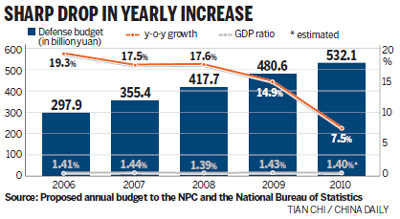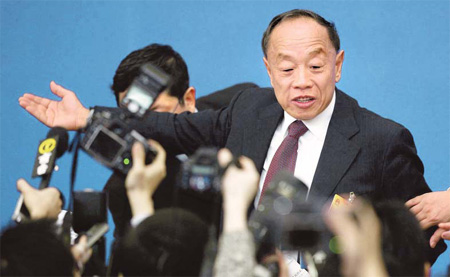Foreign and Military Affairs
China's military spending slows
By Cui Xiaohuo (China Daily)
Updated: 2010-03-05 06:43
 |
Large Medium Small |
|
|
Lowest growth in two decades a reflection of economic reality
BEIJING: Military spending will see surprisingly low growth this year, which senior officers and analysts attribute to a difficult financial year.
But they forecast that budgetary allocations will rise when the economy turns more robust.
The increase in 2009 was nearly 15 percent.
Li did not specify reasons behind the drop at the first press conference of the annual session of the top legislature. But the former foreign minister did say the additional funds will be spent on restructuring and raising the combat capability of the 2.3-million-strong People's Liberation Army.
Li said that as a proportion of GDP, China still spends less than other countries, such as the US. The latter's military spending amounts to about 4 percent of the nation's gross domestic product, compared with about 1.4 percent for China.
"The slower increase in our spending is part of the agreed agenda between the government and the military because of the financial difficulty this year," said Hu Yanlin, a retired admiral and former political commissar of the PLA Navy.
But after the economy gathers steam again, defense spending should increase at an "adequately fast pace", the NPC deputy said.
"The need for advanced armaments may also call for faster increase in spending in the future," Hu told China Daily on Thursday at the headquarters of the 268-member PLA delegation, the largest in the session for years.
Senior Colonel Li Jie, a researcher with the navy's military academy, said although the military budget reflects the country's overall economic strength, there is always scope for increases.
"More multi-tasking operations overseas will likely absorb more and more resources, and funds are also needed for general welfare and special projects," Li told China Daily.
President Hu Jintao said at last year's annual legislative meeting that China's military capabilities should match the growing interests of the national economy.
Li Zhaoxing did not respond directly to a question on the widely-speculated aircraft carrier project, which the government has not confirmed.
But Beijing-based military strategist Song Xiaojun said even if the project got the go-ahead, spending will not stand out in any one fiscal year.
"Building aircraft carriers is a long-term project and like any other military in the world, the Chinese army will divide the overall spending over a period of time, if it is on its agenda," Song said.
Thursday's announcement of the military budget raised debate in international media.
"It's surprising that (the yearly increase) has gone below 10 percent. I thought it would go up by about 15 percent. I think the armed forces will be dissatisfied," Reuters quoted Ikuo Kayahara, professor of security studies at Takushoku University in Japan. as saying.
"The world has been criticizing China for increasing its defense budget by more than 10 percent every year," he said. "China may be reacting to this by trying to show that it is not focused only on expanding its armed forces."













